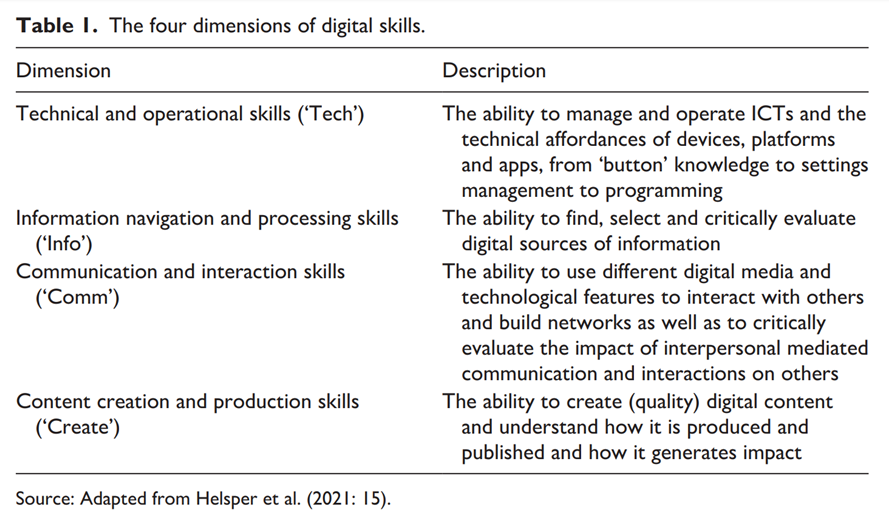Around the world governments encourage teaching in digital skills and literacies in the school curriculum and promote digital learning at home. The hope is that gaining digital skills will help implement e-government initiatives, foster civic participation, prepare young people for the ‘jobs of the future’, promote domestic adoption of digital consumer goods and services and enable citizens to locate and evaluate trustworthy information. These efforts vary hugely in their nature and goals, and it’s not clear if they actually work. In this blog, Sonia Livingstone, Giovanna Mascheroni and Mariya Stoilova discuss their new article arguing that what really matters to outcomes is the specific types of digital skills being gained.
What’s meant by digital skills?
The United Nations agency responsible for global measurement of the adoption of information and communication technologies defines digital skills in terms of their expected outcomes:
‘the ability to use ICTs in ways that help individuals to achieve beneficial, high-quality outcomes in everyday life for themselves and others’ and that ‘reduce potential harm associated with more negative aspects of digital engagement.’
This leaves open the question of which abilities people actually need – as well as that of the outcomes at stake. In the ySKILLS project, a research collaboration designed to study the relationship between digital skills and children’s wellbeing, we have identified four dimensions of digital skills encompassing on technical, information, communication and content creation skills (see Table 1).
Our ySKILLS research
We searched the published literature for empirical studies of the digital skills of young people aged 12-17 years old, building on our earlier review of all the available evidence of the antecedents and consequences of their digital skills. We found 34 good quality studies, mainly published in high income countries, all using survey methodology. This means that the findings about the relation between skills and outcomes are correlational, though some studies use statistical techniques to test causal hypotheses.
Different outcomes are linked to different dimensions of youth digital skills
The analysis generated two key findings:
- Teaching or promoting technical skills by themselves alone emerges as a problematic strategy. For example, while being positively associated with a positive orientation to technology, technical skills are also linked to more online risks and reduced civic participation among young people. This is particularly worrying given the substantial focus on technical skills in IT education in many countries, especially if coupled with an insufficient emphasis on critical or evaluation aspects of digital skills.
- The findings for gaining information skills are much more promising, for these are generally linked to beneficial outcomes. For example, young people with more information skills tend to benefit from more civic participation, online opportunities, higher academic grades, reduced online risks and more privacy-protective behaviour online. Also positive for young people’s outcomes are certain combinations of digital skills dimensions, provided that gaining information skills is included in the mix.
We were also able to shed some light on the types of outcomes that have been researched:
- Most research on the outcomes of digital skills concerns the range of online opportunities or risks encountered by children and young people. It may seem surprising that relatively few studies have examined the benefits of gaining digital skills on academic grades;.
- Greater digital skills are linked to more online opportunities and information benefits. For example, children who are more skilled at seeking information online are more likely to look for online information for homework and to think more often about information credibility.
But a fair body of research also suggests that greater digital skills are linked, directly or indirectly, to more exposure to online risks, although the implications for harm remain unclear.
We conclude our article with evidence-based recommendations.
Policymakers should:
- Provide greater clarity in specifying the expected outcomes of promoting digital skills among youth. What kinds of benefits do policymakers, including educational policy, expect from gaining digital skills, and for whom? Are these benefits clear when digital skills initiatives are introduced, funded and evaluated?
- Recognise that not all digital skills are linked to beneficial outcomes: promoting technical skills alone emerges as a problematic strategy; however, gaining information skills alone or in combination with other sets of skills is more promising. This has implications for educational policy and curriculum design.
- Be aware that promoting digital skills enhances both online opportunities and online risks. The issue here is the unintended consequences of a more digitally skilled population. For as research has long shown, more skilled young people tend to explore more widely and deeply online and find themselves exposed to risk even as they enjoy more opportunities.
- Regarding the digital inclusion agenda, note the further research findings that interventions help equalize beneficial outcomes for children when they enhance access to ICTs resources at home and adopt enabling parental mediation.
Researchers should:
- Undertake more exploratory, measurement and analytic work on the potential outcomes, both short-term and long-term, of gaining digital skills, including among children of different ages and circumstances.
- Conduct targeted research on the particular outcomes expected by digital skills initiatives: for instance, noting how many schools invest in technology to improve children’s educational outcomes, researchers could examine whether gaining digital skills improves academic grades.
- Conduct more research on the differential effect of skills dimensions on different outcomes. This means avoiding the use of online activities as a proxy for skills, as well as avoiding composite digital skill measures which obscure those differential effects.
Use statistical models to identify how best to improve outcomes for children through interventions that harness the mediating role of digital skills positioned between antecedents and consequences. For instance, the potential of digital skills for overcoming digital exclusion and enhancing beneficial outcomes needs further investigation, as does the conundrum of whether gaining digital skills can reduce young people’s experiences of harm following exposure to online risk.
Watch our presentation of the paper
Download presentation slides
Notes
This text was originally published on the ySKILLS blog and has been re-posted with permission.
This post represents the views of the authors and not the position of the Parenting for a Digital Future blog, nor of the London School of Economics and Political Science.
Featured image: photo by Markus Distelrath on Pixabay







